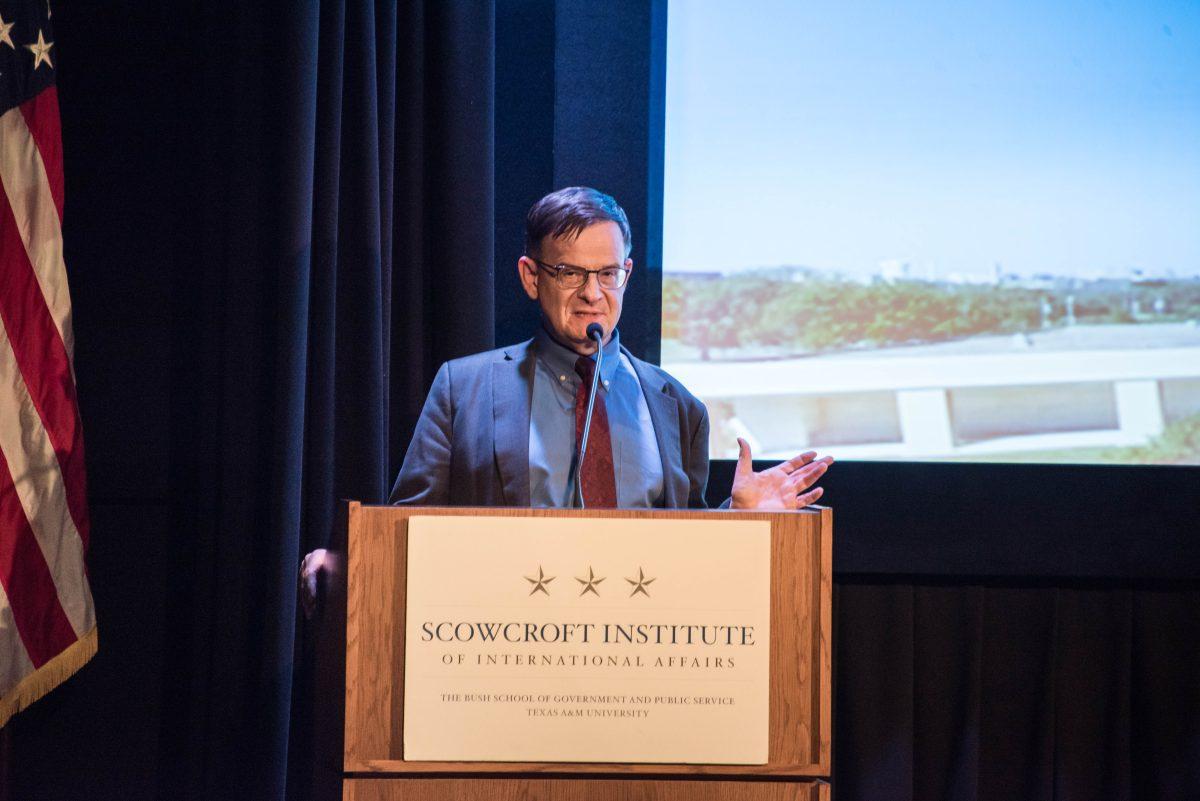The mental state of Kim Jong-un and the current atmosphere of U.S.-Korean relations was the topic of discussion by a North Korea expert at a lecture at the Bush School on Oct. 24.
Andrei Lankov, Director at the Korea Risk Group and a professor at Kookmin University in Seoul, South Korea took the stage at the Bush School to discuss concerns about the North Korean leader Kim Jong-un.
With recent news about North Korea’s developing missile program and heightening tensions between the U.S. government and Pyongyang, many people have become increasingly nervous about Kim Jong-un.
Kim is comparatively young for a world leader at 35 years old, and is often portrayed by Western media as unhinged. Lankov said he does not share this view.
“If you read newspapers about North Korea as a kind of a current topic it’s like he is unpredictable. ‘God knows what he’s saying, why he’s saying it what is he doing he’s a dangerous madman’ — no he’s not,” Lankov said. “He’s dangerous, but he’s not madman.”
According to Lankov, Kim Jong-un does not consider his primary goal to be the protection of his people or the annihilation of the Western world, but simply to carry on his family’s regime.
“I believe his major strategic goal is essentially the same as the strategic goal of his father — that is to die natural death in his bed at a ripe old age is goal number one,” Lankov said. “A distant second is to develop his country.”
Within the framework of this logic, according to Lankov, Kim’s actions become far more decipherable.
“He has been a success, a really great success — from his point of view,” Lankov said. “In the last five years he has been remarkable at increasing his chances for survival.”
Based on all of his research and personal experiences with the North Koreans, Lankov takes a far less reactionary stance to the current tensions between the U.S. and North Korea saying he does not foresee an attack on America by Kim Jong-un anytime soon.
“I’d say within the next 10 years, there is about a fifty percent chance that things look like now,” Lankov said.
When asked about how U.S.-Korean relations have changed under the Trump administration, Lankov said attitudes in North Korea are largely unchanged and he doesn’t feel the American media is reflective of the news coming out of Pyongyang.
“If you ask North Koreans, they say this is just normal, nothing special,” Lankov said.
Ben Zimmer, a prospective international affairs student, said he was already familiar with Lankov’s work and was interested in hearing his more recent opinions.
“He makes the same points in a lot of his books in a lot more linear fashion,” Zimmer said. “A lot of the points that he made were newer because they’re more updated, they’re interesting.”
Zimmer also said he was frustrated at the reactionary nature of the Western relationship with Kim Jong-un.
“I think a lot of times his standpoint is overlooked,” Zimmer said. “No one really cares, everyone’s shortsighted, whenever they launch missiles they say, ‘Oh no he launched a missile’ and then two days later — nothing.”
Devin Malone, an international affairs graduate student who attended the lecture at the recommendation of a professor said he appreciated Lankov’s first hand insight into North Korean affairs.
“It was nice to get kind of an inside perspective from someone who’s actually been there,” Malone said. “I didn’t know North Korea allowed foreigners to study at their university.”
Malone said he appreciated Lankov’s approach to discussing North Korea, contrasting it with more sensationalized information he’s heard.
“I always hear kind of the extremes of either side,” Malone said. “But this guy, professor Lankov … he seemed like he had more of a grounded approach to the situation with North Korea.”
Guest lecturer discusses North Korea relations
October 24, 2017
Photo by Photo by Cassie Stricker
North Korea expert Andrei Lankov spoke Tuesday about the mental state of Kim Jong-un and the relationship between America and North Korea.
0
Donate to The Battalion
$2790
$5000
Contributed
Our Goal
Your donation will support the student journalists of Texas A&M University - College Station. Your contribution will allow us to purchase equipment and cover our annual website hosting costs, in addition to paying freelance staffers for their work, travel costs for coverage and more!
More to Discover










